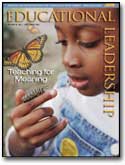Letters to the Next President
Edited by Carl Glickman, 2004
As educators return to school this fall, they may want to take time to look at a new book that gives voice to many of their concerns about and hopes for the future of education. Letters to the Next President presents a collection of letters written by well-known education leaders and activists as well as by students, teachers, researchers, and policymakers.
These letters are powerful testaments to the complex issues that the next president, whoever that may be, will face, including school and class size, teacher quality, the impact of standards and high-stakes testing, and issues of resource adequacy and political will. The book does not offer a silver bullet. Each author identifies his or her own issues and proposes unique and occasionally disparate solutions. Their charges to the president include the following:You must make it clear to all, especially your policymaking colleagues, that one may leave the local school but not his or her responsibility, as a citizen in our political and social democracy, for the maintenance of a robust system of public schooling. (John I. Goodlad)Work to ensure that the parents of my students can earn a wage that they can support themselves and their children on. . . . Any attempt to improve student achievement without also improving the society that produces those students is doomed to failure. (Edward C. Montgomery, teacher)When you are elected, be sure the people making decisions about education on your behalf in Washington have recently spent time in schools and that their own children attend the schools about which they are making policy. Look for people you'd trust to take care of your own kids. (Deborah Meier)
These letters demonstrate their writers' immense energy and will to make public education work. Perhaps the most important lesson the next president will get from these letters is that educators can and should be trusted partners in improving education. Carrots and sticks and a pervasive lack of trust will not address the issues our schools and students face. But by working together as sincere and energetic partners, educators, students, parents, and policymakers can make real strides toward ensuring that no child is left behind.
Published by Teachers College Press, 1234 Amsterdam Ave., New York, NY 10027. www.tcpress.com. 272 pages. Price: $14.95 paperback.
—Reviewed by Dan Laitsch, Senior Policy Analyst, and Don Ernst, Director of Government Relations, ASCD
Teaching in the Knowledge Society
Andy Hargreaves, 2003
Sept. 11, 2001 “moved the world in a few short minutes from the optimistic age of information to an anxiety-ridden age of insecurity,” writes Hargreaves. In this book, he describes how the juxtaposition of global events and the changing demographics of a new generation of teachers inspired him to reassess his vision of what teaching and learning should look like.
Current reform efforts, based on “soulless standardization,” fail to move us beyond the knowledge economy, which, with its “relentless pursuit of profit and self-interest,” promotes a type of market fundamentalism that widens the gap between successful and not-so-successful groups. Hargreaves's survey findings illustrate teachers' divisions about the success of standards-based reform. Teachers of middle-class students reported few problems meeting the standards. But teachers of the poor, the —alized, those learning English as a new language, and those with special education needs were disheartened by the inability of most of their students to meet basic standards. What's missing is an understanding of the second component of the information age—the knowledge society, or learning community. The learning community puts the soul back into reform because its primary aim is to involve the whole community in shared inquiry, the use of data to inform practices, and continual learning.
Hargreaves's thought-provoking vision reminds educators of our responsibility to support reforms that not only encourage skill development but also help students deal with the significant moral and social challenges they will face in this new, redefined world:Those who focus only on teaching techniques and curriculum standards and do not also engage teachers in the greater social and moral questions of their time promote a diminished view of teaching and teachers' professionalism that has no place in a sophisticated knowledge society.
Published by Teachers College Press, 1234 Amsterdam Ave., New York, NY 10027. www.tcpress.com. 229 pages. Price: $24.95 paperback.
—Reviewed by Diane L. Jackson, Online Instructional Designer, ASCD

